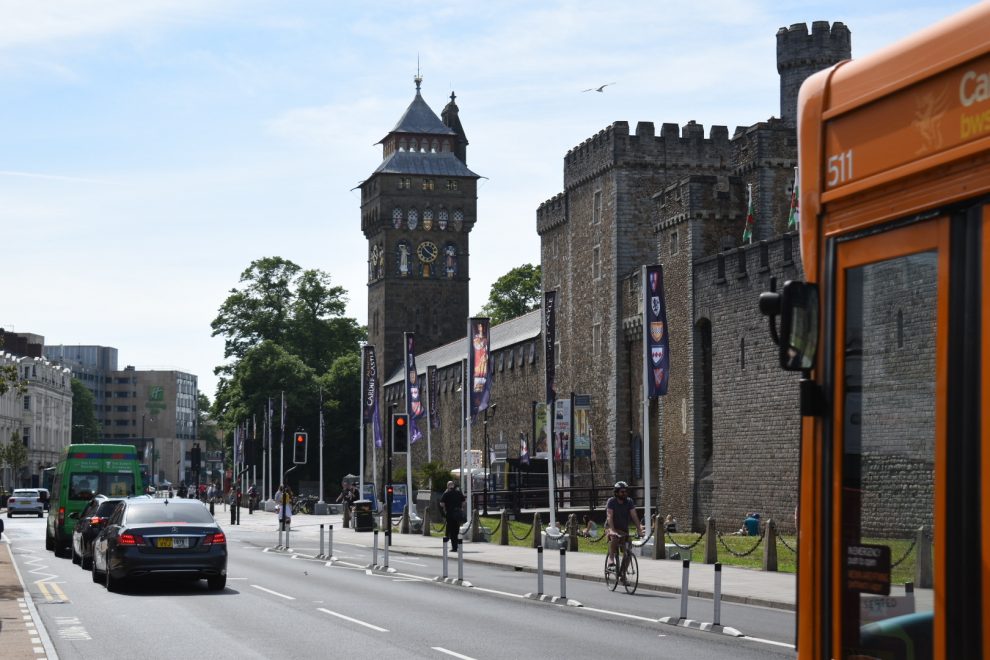A COUNCIL official has attempted to allay fears over plans to keep Cardiff’s Castle Street open to all traffic after concerns were raised over air pollution.
At a Cardiff Council environmental scrutiny committee meeting on Monday, April 24, Cllr Bob Derbyshire said he was disappointed the council wasn’t in a position to close the road to cars, pointing to the fact that the city centre is regularly used by shoppers and residents.
The council’s director of planning, transport and environment, Andrew Gregory, said the council is trying to move “as quickly as possible” to a transport environment which “improves air quality” as a city-wide issue.
Following a public consultation, Castle Street was re-opened to general traffic in June 2021 as a temporary measure.
On April 14, the council revealed it is now looking to make the current arrangement permanent.
Cardiff Council’s cabinet will meet to discuss two options for the future of Castle Street at its meeting on Thursday, April 27, with a recommendation, subject to Welsh Government funding, to allow general traffic to continue using it (option one).
Option number two is to only allow buses, taxis and cyclists to use the road.
Cllr Derbyshire said at Monday’s scrutiny committee meeting: “One of the things that did bother me was the fact that we are talking about a permanent solution, whereas I’d hoped that the solution which is being talked about in option one is only there until we feel that perhaps we have got a better public transport system like the Metro in place to supplement it.”
Cardiff Council hopes that keeping Castle Street open to general traffic will help improve traffic flow and air quality across the city’s wider road network.
Both options set to be discussed by cabinet would apparently meet the Welsh Government requirements to deliver air quality compliance.
However, Mr Gregory himself accepted that any level of air quality deterioration is impactful on health.
“Obviously, even though the levels at the moment are below what is considered to be acceptable, that doesn’t mean that it is not harmful,” added Cllr Derbyshire.
“I would just be interested to know in terms of the dispensation of traffic whether or not that traffic which is going to different places actually affects more people, because it is people we are talking about here, than actually would benefit from it on Castle Street.
“Because you have got a lot of shoppers there, you have got people who live in the city centre now.”
In response to Cllr Derbyshire, Mr Gregory said: “Yes we have. It has been one of the key issues for consideration in modelling in terms of the impact on both the adjoining residential areas, but also for the wider city.
“There are relatively minor differences between the schemes. Obviously, there is a significant issue in terms of the difference in Castle Street, but we have been very careful in terms of the impact on the surrounding residential areas to make sure that they are all compliant.
“I think the more general point that Cllr Derbyshire makes is something we are really mindful of, which is that the Welsh Government direction placed the limit at 40 micrograms per cubic meter, but the evidence that we are seeing and is emerging quite regularly is that any level of air quality deterioration is actually impactful on health.
“We are very mindful that there are certain areas in the city which get this impact far more than others just because of the way that Cardiff is used… and it tends to be some of the more local inner city areas.”
Mr Gregory went on to add: “There is a broader picture and although Welsh Government, for legal reasons, has set it at 40, there will be a discussion about lowering that level as we move forward and we should all expect it to move to 30 and to ultimately lower targets to significantly less because the impacts are recognised.”



















